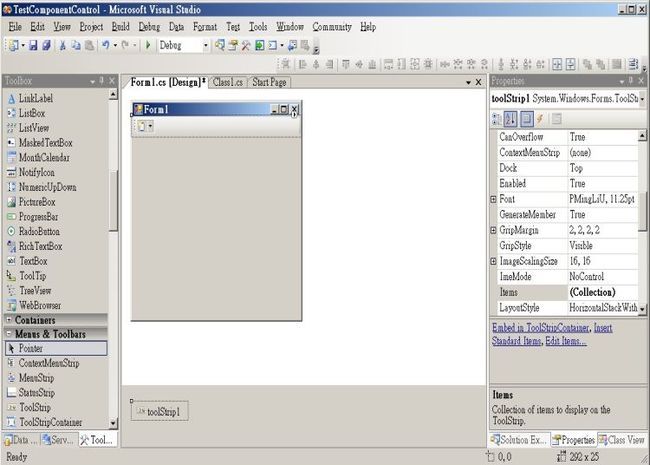- 详解“c:/work/src/components/a/b.vue“‘ has no default export报错原因
hw_happy
开发语言前端vue.jsjavascript
前情提要在一个vue文件中需要引入定义的b.vue文件,但是提示b文件没有默认导出,对于vue2文件来说有exportdefault,在中,所有定义的变量、函数和组件都会自动被视为默认导出的组件内容。因此,不需要显式地使用exportdefault来导出组件。但是在我引用这个文件的时候还是提示了这个错误,原来是我的项目使用了ts和vite\webpack,因为TypeScript和Vue的默认导出
- 说说在 Vue.js 中如何实现组件间通信
deniro
1用法假设父组件的模板包含子组件,我们可以通过props来正向地把数据从父组件传递给子组件。props可以是字符串数组,也可以是对象。html:js:Vue.component('deniro-component',{props:['message'],template:'{{message}}'});varapp=newVue({el:'#app',data:{}});渲染结果:"嫦娥四号"成功
- java获取applicationcontext,SpringBoot获取ApplicationContext的3种方式
花儿街参考
ApplicationContext是什么?简单来说就是Spring中的容器,可以用来获取容器中的各种bean组件,注册监听事件,加载资源文件等功能。ApplicationContext获取的几种方式1直接使用Autowired注入@ComponentpublicclassBook1{@AutowiredprivateApplicationContextapplicationContext;pub
- Vue组件学习
yancolin
Vue的精华之处就在于它的组件,重复使用,节省代码,提升工作效率。Vue组件要使用先要注册,注册分为全局的和局部的注册。全局注册:注:1.my-component就是注册的组件自定义标签名称;2.template的DOM结构必须被一个元素包含,如果直接写成'全局组件',不带""是无法渲染的。Vue.component('my-component',{template:'全局组件';});varap
- Superset二次开发之源码DependencyList.tsx 分析
aimmon
Superset二次开发SupersetBI二次开发typescript前端
功能点路径superset-frontend\src\dashboard\components\nativeFilters\FiltersConfigModal\FiltersConfigForm\DependencyList.tsx/***LicensedtotheApacheSoftwareFoundation(ASF)underone*ormorecontributorlicenseagre
- Android-悬浮窗功能的实现(附Java、KT实现源码)(1)
egrhef
程序员androidjava开发语言
//获取服务的操作对象valbinder=serviceasFloatWinfowServices.MyBinderbinder.service}overridefunonServiceDisconnected(name:ComponentName){}}overridefunonActivityResult(requestCode:Int,resultCode:Int,data:Intent){
- K8S学习笔记02——K8S组件
沉淅尘
#Docker#K8Skubernetes
Kubernetes组件一、控制平面组件(ControlPlaneComponents)(1)kube-apiserver(2)etcd(3)kube-scheduler(4)kube-controller-manager(5)cloud-controller-manager二、Node组件1.kubelet2.kube-proxy3.容器运行时(ContainerRuntime)三、插件(Add
- vue在一个组件引用其他组件
hzw0510
Vuevue.js前端javascript
在vue一个组件中引用另一个组件的步骤必须在script中导入要引用的组件需要在exportdefault的components引用导入的组件(这一步经常忘记)在template使用导入的组件importVue01from"@/components/Vue01.vue";
- 【设计模式】结构型模式:组合模式
KunQAQrz
意图使用组合模式可以将对象组合成树状结构,并且能像使用独立对象一样使用它们。组合模式结构在这里插入图片描述组件(Component)接口描述了树中简单项目和复杂项目所共有的操作。叶节点(Leaf)是树的基本结构,它不包含子项目。一般情况下,叶节点最终会完成大部分的实际工作,因为它们无法将工作指派给其他部分。容器(Container)又名“组合(Composite)”是包含叶节点或其他容器等子项目的
- react中如何获取并使用usestate声明的变量的值
小华0000
react.jsjavascript前端
1.函数式更新当需要根据当前状态来更新状态时,可以使用函数式更新。setState(在类组件中)和setCount(在useState中)都可以接受一个函数作为参数,这个函数接收当前的状态作为参数,并返回新的状态。functionExampleComponent(){const[count,setCount]=useState(0);//使用函数式更新functionhandleClick(){s
- uniapp+uview-plus实现微信小程序自定义tabbar
yx_back
小程序前端uniappuni-app微信小程序uview-plus
参考文档微信小程序相关开发文档链接:https://developers.weixin.qq.com/miniprogram/dev/framework/ability/custom-tabbar.html虽然是uniapp框架但是实现方式和原生小程序相似实现思路1、app.json里面tabBar添加配置custom:true,其他和非自定义设置一样2、在components文件夹里添加Tabb
- Ubuntu虚拟机在node命令行中编译.sol文件报错:{“errors“:[{“component“:“general“,“formattedMessage“...(已解决)
拔牙不打麻药
疑难杂症区块链虚拟机node
Ubuntu虚拟机在node命令行下编译.sol文件报错'{"errors":[{"component":"general","formattedMessage":"*Line1,Column1\\nSyntaxerror:value,objectorarrayexpected.\\n*Line1,Column2\\nExtranon-whitespaceafterJSONvalue.\\n","
- VUE中使用vue-office/pdf预览PDF
人间废料记
vue.jspdf前端
安装npminstall@vue-office/pdfVUE组件中importVueOfficePdffrom'@vue-office/pdf';importEmptyElefrom'@/components/EmptyEle/index';//没有数据时的占位组件constprops=defineProps({pdfUrl:{type:String,default:''}});/*这块是处理边上
- VueTreeselect el-tree-select 多选
小小并不小
Vueelementjsvue.jsjavascript
1、VueTreeselect是一个多选组件npminstall--save@riophae/vue-treeselect全部代码//importthecomponentimportTreeselectfrom'@riophae/vue-treeselect'//importthestylesimport'@riophae/vue-treeselect/dist/vue-treeselect.cs
- Vue 和 React 的对比
淘淘是只狗
vueReactvue.jsreact.jsjavascript
React和Vue有许多相似之处:使用VirtualDOM提供了响应式(Reactive)和组件化(Composable)的视图组件。将注意力集中保持在核心库,而将其他功能如路由和全局状态管理交给相关的库。运行时性能React在React应用中,当某个组件的状态发生变化时,它会以该组件为根,重新渲染整个组件子树。如要避免不必要的子组件的重渲染,你需要在所有可能的地方使用PureComponent,
- echarts象形渐变柱状图
星星跌入梦境*
echartsangular.js前端
一、效果图如下:二、代码如下(1)父组件importitemfrom'../bigdata/components/item.vue'exportdefault{components:{item}}.page-con{width:100%;height:100%;.main-con{width:35%;height:33%;}}(2)子组件importechartsfrom"echarts";exp
- 【Spring】Spring中@Component和@Bean的区别?
九师兄
框架-springbootspringjava后端
1.概述在Spring框架中,@Component和@Bean是两个常用的注解,用于实现组件的声明和配置。它们的主要区别如下:作用对象不同:@Component注解用于声明一个类为Spring容器的组件(Bean),Spring会自动扫描并将其实例化为Bean并管理。@Bean注解用于在配置类(通常是带有@Configuration注解的类)中声明一个方法,该方法的返回值将被注册为Spring容器
- DMA与AXI DMA ip
光之大主宰
FPGAfpga开发硬件架构硬件工程驱动开发
文章目录AXIDMAReadChannel(读通道)WriteChannel(写通道)#其他选项ScatterGatherEngine特点工作流程AXIDMA配置项说明ComponentName(axi_dma)DMA组件的名称,可以自定义。EnableAsynchronousClocks允许DMA在不同时钟域之间工作,适用于不同频率的模块。EnableScatterGatherEngine启用S
- 微信小程序之轮播图组件封装
鱼在在
vueuni-app微信小程序javascript
目录封装组件——mp-rotationchat组件的属性与方法——swiper-rotation-chat.js组件的引入使用封装组件——mp-rotationchat文件目录components(所有组件位置)swiper-roatiton-chat(轮播图组件包)swiper-rotation-chat.wxmlswiper-rotation-chat.jspages(所有页面)index(初
- 微信小程序中实现类似于 ECharts 的图表渲染及优化
人工智能的苟富贵
前端小程序微信小程序echarts小程序
文章目录前言一、微信小程序中使用ECharts概述二、ECharts在小程序中的集成步骤2.1在小程序项目的根目录下,运行以下命令安装echarts依赖:2.2在小程序的components文件夹中创建ec-canvas组件。2.3在需要展示图表的页面中,引用ec-canvas组件,并初始化ECharts图表:三、微信小程序中使用Canvas绘制图表基础示例:绘制一个简单的折线图四、动态数据更新的
- C#中关闭窗口清除内容
Vae_Mars
AI对话中的其他知识c#开发语言
1.解释说明-窗口关闭时是可以执行函数的,可以做一部分事件处理-因为删除文件夹的方案不好做,所以改成清空文件夹内的内容2.程序示例publicMainWindow(){InitializeComponent();//检查窗口关闭this.Closing+=MainWindow_Closing;}//执行具体的方法privatevoidMainWindow_Closing(objectsender,
- 一篇文章讲清楚ECC和S/4HANA的主要区别
syounger
SAP学习制造
今天给大家分享一下SAPECC和SAPS/4HANA的主要区别,开始比较之前,让我们先回顾一下这两款SAP的重量级ERP产品。什么是SAPECC?SAPECC全称是SAPERP中央组件(ERPCentralComponent)。SAPECC采用模块化设计,可高度定制。我们可以配置SAPECC以满足业务各个领域的需求,从财务到后勤。什么是SAPS/4HANA?SAPS/4HANA是SAP最新一代的E
- Unity3D DOTS系列之Struct Change核心机制分析详解
Thomas_YXQ
开发语言Unity3D游戏unity架构
引言Unity3D的DOTS(Data-OrientedTechnologyStack)体系为游戏开发带来了革命性的变化,它通过ECS(EntityComponentSystem)模型,将游戏中的对象(Entity)、属性(Component)和行为(System)分离,以数据驱动的方式来提高游戏的性能和可扩展性。在DOTS体系中,StructChange是一个核心的内存管理机制,它涉及对Enti
- 【解决】AnimationCurve 运行时丢失数据问题
野奔在山外的猫
解决指导Unity常见开发问题处理方案unity
开发平台:Unity2022编程平台:VisualStudio编程语言:CSharp 一、问题背景如上图所示的GracityComponent组件中,引用AnimationCurve作为可调属性。但在实际使用中出现数据丢失问题。大致为以下两种情况:运行时,配置的AnimationCurves出现丢失情况。非运行下,切换Selection.gameObject(选择游戏对象)时出现丢失情况。 二、源
- OPAMC架构介绍
OnRoadZy
架构开发语言racketlispECS
1OPAMC的概念OPAMC架构来源于ECS架构的思想,用于实现面向对象绘图,采用Racket语言(Lisp语言的一个方言)实现。ECS架构(全称Entity-Component-System,即实体-组件-系统)是一种软件架构模式,主要用于游戏开发。ECS遵循组合优于继承的原则,游戏内的每一个基本单元都是一个实体,每个实体又由一个或多个组件构成,每个组件仅仅包含代表其特性的数据(即在组件中没有任
- C# WPF中的GUI多线程技巧详解
zls365365
c#wpf开发语言
1.使用BackgroundWorker组件代码示例:publicpartialclassMainWindow:Window{privateBackgroundWorkerbackgroundWorker=newBackgroundWorker();publicMainWindow(){InitializeComponent();backgroundWorker.DoWork+=Backgroun
- Livewire Flash 教程
巫文钧Jill
LivewireFlash教程livewire-flashALaravelLivewire-basedFlashmessagecomponent项目地址:https://gitcode.com/gh_mirrors/li/livewire-flash项目介绍LivewireFlash是一个专为Laravel框架设计的Livewire组件,它提供了简单易用的方式来添加和显示flashed(闪烁)消息
- React 开发者完全指南:React.FC()、函数组件 和更多
夏目艾拉
react.jsjavascripttypescript前端react前端框架
前言React.FC是一个TypeScript类型,用于React函数组件。FC代表FunctionalComponent(函数组件)。这个类型的使用有助于在TypeScript项目中编写类型安全的React组件。使用React.FC为组件定义类型就可以享受到TypeScript提供的类型检查和自动补全等特性,让开发过程更加高效和减少错误。为了了解React.FC,我们还需要先知道函数组件是什么。
- 微信小程序自定义组件及传参
墨染凉梦
微信小程序小程序
1.新建文件夹,然后右键选择新建components2.组件的js结构如下图所示3.使用组件,在需要引用组件的页面json配置中引入组件4.组件传参之父传子父组件直接传参子组件在properties中接收,直接使用即可5.子组件传参给父组件子组件使用this.triggerEvent('事件名',参数)进行传参。父组件bind+事件名='回调方法'进行接收,并在回调方法中可以获得传递的参数
- VUE在线预览word、pdf、excel等文档
菜鸟程序猿、
vue.jspdf前端
http://www.pfile.com.cn/api/profile/onlinePreview?url=(需要在线查看的文档地址)vue代码window.open('http://www.pfile.com.cn/api/profile/onlinePreview?url='+encodeURIComponent(“需要在线查看的文档地址”));文档参考:http://www.pfile.co
- 解读Servlet原理篇二---GenericServlet与HttpServlet
周凡杨
javaHttpServlet源理GenericService源码
在上一篇《解读Servlet原理篇一》中提到,要实现javax.servlet.Servlet接口(即写自己的Servlet应用),你可以写一个继承自javax.servlet.GenericServletr的generic Servlet ,也可以写一个继承自java.servlet.http.HttpServlet的HTTP Servlet(这就是为什么我们自定义的Servlet通常是exte
- MySQL性能优化
bijian1013
数据库mysql
性能优化是通过某些有效的方法来提高MySQL的运行速度,减少占用的磁盘空间。性能优化包含很多方面,例如优化查询速度,优化更新速度和优化MySQL服务器等。本文介绍方法的主要有:
a.优化查询
b.优化数据库结构
- ThreadPool定时重试
dai_lm
javaThreadPoolthreadtimertimertask
项目需要当某事件触发时,执行http请求任务,失败时需要有重试机制,并根据失败次数的增加,重试间隔也相应增加,任务可能并发。
由于是耗时任务,首先考虑的就是用线程来实现,并且为了节约资源,因而选择线程池。
为了解决不定间隔的重试,选择Timer和TimerTask来完成
package threadpool;
public class ThreadPoolTest {
- Oracle 查看数据库的连接情况
周凡杨
sqloracle 连接
首先要说的是,不同版本数据库提供的系统表会有不同,你可以根据数据字典查看该版本数据库所提供的表。
select * from dict where table_name like '%SESSION%';
就可以查出一些表,然后根据这些表就可以获得会话信息
select sid,serial#,status,username,schemaname,osuser,terminal,ma
- 类的继承
朱辉辉33
java
类的继承可以提高代码的重用行,减少冗余代码;还能提高代码的扩展性。Java继承的关键字是extends
格式:public class 类名(子类)extends 类名(父类){ }
子类可以继承到父类所有的属性和普通方法,但不能继承构造方法。且子类可以直接使用父类的public和
protected属性,但要使用private属性仍需通过调用。
子类的方法可以重写,但必须和父类的返回值类
- android 悬浮窗特效
肆无忌惮_
android
最近在开发项目的时候需要做一个悬浮层的动画,类似于支付宝掉钱动画。但是区别在于,需求是浮出一个窗口,之后边缩放边位移至屏幕右下角标签处。效果图如下:
一开始考虑用自定义View来做。后来发现开线程让其移动很卡,ListView+动画也没法精确定位到目标点。
后来想利用Dialog的dismiss动画来完成。
自定义一个Dialog后,在styl
- hadoop伪分布式搭建
林鹤霄
hadoop
要修改4个文件 1: vim hadoop-env.sh 第九行 2: vim core-site.xml <configuration> &n
- gdb调试命令
aigo
gdb
原文:http://blog.csdn.net/hanchaoman/article/details/5517362
一、GDB常用命令简介
r run 运行.程序还没有运行前使用 c cuntinue
- Socket编程的HelloWorld实例
alleni123
socket
public class Client
{
public static void main(String[] args)
{
Client c=new Client();
c.receiveMessage();
}
public void receiveMessage(){
Socket s=null;
BufferedRea
- 线程同步和异步
百合不是茶
线程同步异步
多线程和同步 : 如进程、线程同步,可理解为进程或线程A和B一块配合,A执行到一定程度时要依靠B的某个结果,于是停下来,示意B运行;B依言执行,再将结果给A;A再继续操作。 所谓同步,就是在发出一个功能调用时,在没有得到结果之前,该调用就不返回,同时其它线程也不能调用这个方法
多线程和异步:多线程可以做不同的事情,涉及到线程通知
&
- JSP中文乱码分析
bijian1013
javajsp中文乱码
在JSP的开发过程中,经常出现中文乱码的问题。
首先了解一下Java中文问题的由来:
Java的内核和class文件是基于unicode的,这使Java程序具有良好的跨平台性,但也带来了一些中文乱码问题的麻烦。原因主要有两方面,
- js实现页面跳转重定向的几种方式
bijian1013
JavaScript重定向
js实现页面跳转重定向有如下几种方式:
一.window.location.href
<script language="javascript"type="text/javascript">
window.location.href="http://www.baidu.c
- 【Struts2三】Struts2 Action转发类型
bit1129
struts2
在【Struts2一】 Struts Hello World http://bit1129.iteye.com/blog/2109365中配置了一个简单的Action,配置如下
<!DOCTYPE struts PUBLIC
"-//Apache Software Foundation//DTD Struts Configurat
- 【HBase十一】Java API操作HBase
bit1129
hbase
Admin类的主要方法注释:
1. 创建表
/**
* Creates a new table. Synchronous operation.
*
* @param desc table descriptor for table
* @throws IllegalArgumentException if the table name is res
- nginx gzip
ronin47
nginx gzip
Nginx GZip 压缩
Nginx GZip 模块文档详见:http://wiki.nginx.org/HttpGzipModule
常用配置片段如下:
gzip on; gzip_comp_level 2; # 压缩比例,比例越大,压缩时间越长。默认是1 gzip_types text/css text/javascript; # 哪些文件可以被压缩 gzip_disable &q
- java-7.微软亚院之编程判断俩个链表是否相交 给出俩个单向链表的头指针,比如 h1 , h2 ,判断这俩个链表是否相交
bylijinnan
java
public class LinkListTest {
/**
* we deal with two main missions:
*
* A.
* 1.we create two joined-List(both have no loop)
* 2.whether list1 and list2 join
* 3.print the join
- Spring源码学习-JdbcTemplate batchUpdate批量操作
bylijinnan
javaspring
Spring JdbcTemplate的batch操作最后还是利用了JDBC提供的方法,Spring只是做了一下改造和封装
JDBC的batch操作:
String sql = "INSERT INTO CUSTOMER " +
"(CUST_ID, NAME, AGE) VALUES (?, ?, ?)";
- [JWFD开源工作流]大规模拓扑矩阵存储结构最新进展
comsci
工作流
生成和创建类已经完成,构造一个100万个元素的矩阵模型,存储空间只有11M大,请大家参考我在博客园上面的文档"构造下一代工作流存储结构的尝试",更加相信的设计和代码将陆续推出.........
竞争对手的能力也很强.......,我相信..你们一定能够先于我们推出大规模拓扑扫描和分析系统的....
- base64编码和url编码
cuityang
base64url
import java.io.BufferedReader;
import java.io.IOException;
import java.io.InputStreamReader;
import java.io.PrintWriter;
import java.io.StringWriter;
import java.io.UnsupportedEncodingException;
- web应用集群Session保持
dalan_123
session
关于使用 memcached 或redis 存储 session ,以及使用 terracotta 服务器共享。建议使用 redis,不仅仅因为它可以将缓存的内容持久化,还因为它支持的单个对象比较大,而且数据类型丰富,不只是缓存 session,还可以做其他用途,一举几得啊。1、使用 filter 方法存储这种方法比较推荐,因为它的服务器使用范围比较多,不仅限于tomcat ,而且实现的原理比较简
- Yii 框架里数据库操作详解-[增加、查询、更新、删除的方法 'AR模式']
dcj3sjt126com
数据库
public function getMinLimit () { $sql = "..."; $result = yii::app()->db->createCo
- solr StatsComponent(聚合统计)
eksliang
solr聚合查询solr stats
StatsComponent
转载请出自出处:http://eksliang.iteye.com/blog/2169134
http://eksliang.iteye.com/ 一、概述
Solr可以利用StatsComponent 实现数据库的聚合统计查询,也就是min、max、avg、count、sum的功能
二、参数
- 百度一道面试题
greemranqq
位运算百度面试寻找奇数算法bitmap 算法
那天看朋友提了一个百度面试的题目:怎么找出{1,1,2,3,3,4,4,4,5,5,5,5} 找出出现次数为奇数的数字.
我这里复制的是原话,当然顺序是不一定的,很多拿到题目第一反应就是用map,当然可以解决,但是效率不高。
还有人觉得应该用算法xxx,我是没想到用啥算法好...!
还有觉得应该先排序...
还有觉
- Spring之在开发中使用SpringJDBC
ihuning
spring
在实际开发中使用SpringJDBC有两种方式:
1. 在Dao中添加属性JdbcTemplate并用Spring注入;
JdbcTemplate类被设计成为线程安全的,所以可以在IOC 容器中声明它的单个实例,并将这个实例注入到所有的 DAO 实例中。JdbcTemplate也利用了Java 1.5 的特定(自动装箱,泛型,可变长度
- JSON API 1.0 核心开发者自述 | 你所不知道的那些技术细节
justjavac
json
2013年5月,Yehuda Katz 完成了JSON API(英文,中文) 技术规范的初稿。事情就发生在 RailsConf 之后,在那次会议上他和 Steve Klabnik 就 JSON 雏形的技术细节相聊甚欢。在沟通单一 Rails 服务器库—— ActiveModel::Serializers 和单一 JavaScript 客户端库——&
- 网站项目建设流程概述
macroli
工作
一.概念
网站项目管理就是根据特定的规范、在预算范围内、按时完成的网站开发任务。
二.需求分析
项目立项
我们接到客户的业务咨询,经过双方不断的接洽和了解,并通过基本的可行性讨论够,初步达成制作协议,这时就需要将项目立项。较好的做法是成立一个专门的项目小组,小组成员包括:项目经理,网页设计,程序员,测试员,编辑/文档等必须人员。项目实行项目经理制。
客户的需求说明书
第一步是需
- AngularJs 三目运算 表达式判断
qiaolevip
每天进步一点点学习永无止境众观千象AngularJS
事件回顾:由于需要修改同一个模板,里面包含2个不同的内容,第一个里面使用的时间差和第二个里面名称不一样,其他过滤器,内容都大同小异。希望杜绝If这样比较傻的来判断if-show or not,继续追究其源码。
var b = "{{",
a = "}}";
this.startSymbol = function(a) {
- Spark算子:统计RDD分区中的元素及数量
superlxw1234
sparkspark算子Spark RDD分区元素
关键字:Spark算子、Spark RDD分区、Spark RDD分区元素数量
Spark RDD是被分区的,在生成RDD时候,一般可以指定分区的数量,如果不指定分区数量,当RDD从集合创建时候,则默认为该程序所分配到的资源的CPU核数,如果是从HDFS文件创建,默认为文件的Block数。
可以利用RDD的mapPartitionsWithInd
- Spring 3.2.x将于2016年12月31日停止支持
wiselyman
Spring 3
Spring 团队公布在2016年12月31日停止对Spring Framework 3.2.x(包含tomcat 6.x)的支持。在此之前spring团队将持续发布3.2.x的维护版本。
请大家及时准备及时升级到Spring
- fis纯前端解决方案fis-pure
zccst
JavaScript
作者:zccst
FIS通过插件扩展可以完美的支持模块化的前端开发方案,我们通过FIS的二次封装能力,封装了一个功能完备的纯前端模块化方案pure。
1,fis-pure的安装
$ fis install -g fis-pure
$ pure -v
0.1.4
2,下载demo到本地
git clone https://github.com/hefangshi/f

